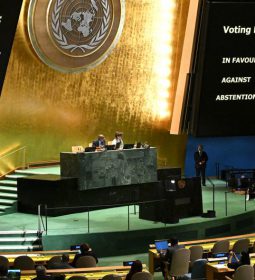Dispelling Islamophobia: Syariah espouses mercy, not punishment

Dispelling Islamophobia: Syariah espouses mercy, not punishment
The Islamic juridical system is a clear reflection of how Islam conceives the world and its relations with humans.
By Dr Azeem Fazwan Ahmad Farouk
04/21/2019
BRUNEI’S decision to implement syariah law was met with intense criticisms by not only the West but liberal leaning Muslims as well.
Such a negative reaction and notion by these parties is only to be expected. This is due to the fact that accolades from the West on anything Islamic are an exception and not the norm.
Brunei’s implementation of syariah law has also solicited the ire of Hollywood celebrities ranging from Elton John to George Clooney. These Hollywood superstars have called for a boycott of Brunei-owned hotels. The condemnation of the Brunei move by the celebrities is a reflection of how prejudice and stereotype figure into our ill-informed judgments.
To be clear, fears about syariah are a manifestation of Islamophobia, and these fears are purposely fanned by certain segments of Western society.
Syariah law has been described by the Western press as inhumane, barbaric, and cruel. Syariah, according to the West, promotes an eye for an eye justice.
The coverage of syariah in the West usually focuses on the criminal justice provisions, known as hudud, developed in the seventh century. Theft was said to merit amputation of the right hand, fornication earned a hundred lashes, and falsely accusing someone of the same offence was punishable by eighty strokes.
The gravest crime, the waging of war against Islam or spreading of disorder in the land, was attended by an entire battery of punitive possibilities: exile, double amputation, suspension from a cross, and decapitation.
In the case of other acts of violence, a victim of the next of kin was formally authorised to act.
These punishments look distinctly pre-modern from a twenty-first century perspective, but it would take either naivete or ill will to characterise them in terms worse than that.
Corporal punishment was a feature of the age, while crucifixion owed its popularity in the Middle East to centuries of Persian and Roman practice and among Muslims, at least in later years, it was intended to be a non-fatal means of humiliation rather than a method of execution.
Torture, which was routine under Christianised Roman law of Byzantium, found no place in the Quran. As a matter of fact, the Quran was suffused with more general concepts of mercy. Repentance was often reason enough to exclude punishment for hudud.
Where an offence gave someone a right to seek vengeance, retaliation was limited by the original crime, and victims were urged to accept compensation or exercise mercy instead.
The rules, for all their rigour, also reflected the ancient notion that responsibility was a matter of honour, and less was expected of those lower down the social pecking order: someone who had unlawful sex having never before been married was subject to lashing than stoning, and the number of strokes inflicted for adultery and intoxication was halved if the convict was a slave.
The most striking fact of them all is the one that today is most likely to be overlooked — physical punishment was authorised just five times in the entire Quran.
The system’s relative leniency is paradoxically illustrated by its harshest prescription — the stoning to death for a married or divorced person who had sex out of wedlock. The penalty itself had been known since at least 2,350 Before Common Era when the king of Mesopotamia stipulated in the world’s oldest known laws that promiscuous women should be executed with rocks bearing their names, and the Israelites notoriously adopted the punishment to kill adulterers as well as blasphemers, witches, wizards, and disobedient sons.
Islamic procedures were novel only in so far as they made it harder to impose.
In order for fornication to be proved against a defendant who denied guilt, four witnesses had to attest to the actual act of penetration in explicit terms and the evidential hurdle was as challenging as it sounds.
Put in another way, the narrative on syariah has to focus on mercy and restraint as opposed to punishment.
As a legal instrument, syariah is constituted by moral law. Unlike the Western legal system, syariah is a moral system in which the law is a tool and technique that is subordinated to and enmeshed in the overarching moral apparatus, but not an end in itself.
In syariah law, the legal system is the instrument of morality and not the other way around. Being constituted by ethical and moral values, syariah strives towards the realisation of moral ends.
While syariah aims to achieve certain ideals, it is not almost always fully achieved in the real world. But rather it appears as benchmarks against which reality is not only measured but pressured.
Syariah law was promulgated within an ethical conception of the world. The premise underpinning syariah is that human beings live in the world not beyond it. The Islamic juridical system is therefore a clear reflection of how Islam conceives the world and its relations with humans.
In syariah, humans are charged with custodianship of this world, and are bound by moral and ethical duties and not rights.
The writer is director of the Center for Policy Research and International Studies at Universiti Sains Malaysia
- Previous Clash of Civilizations? Easter Sunday explosions at multiple churches and hotels rock Sri Lanka, death tolls rises past 200
- Next Turning China’s Belt and Road Initiative into a new cold war weapon by the US is deeply frustrating
















